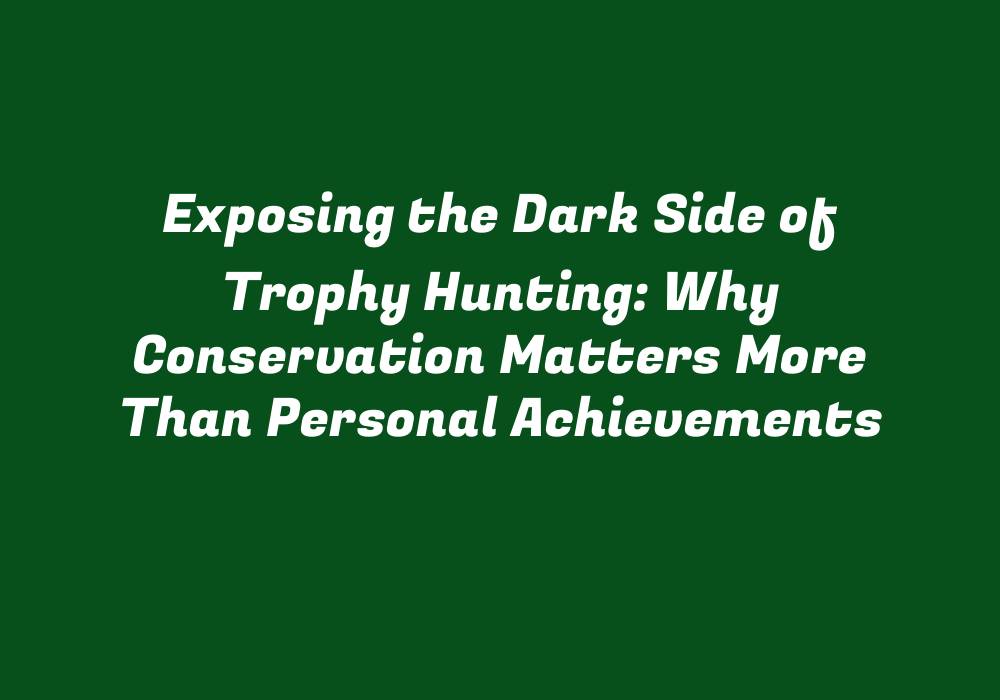Introduction
Trophy hunting has been a controversial issue for decades, with some people arguing that it helps in the conservation of endangered species while others vehemently oppose it as an inhumane practice. This article delves into the dark side of trophy hunting and discusses why focusing on conservation plays a more crucial role than personal achievements through this controversial practice.
The Dark Side of Trophy Hunting
Trophy hunting refers to the killing of animals, particularly for their unique appearance, size, or as representatives of species in danger of extinction. Proponents argue that it provides funds for game management and conservation efforts that help maintain healthy ecosystems. However, critics claim it only fuels greed and does not genuinely contribute to wildlife preservation.
The Cruelty Involved
One major downside of trophy hunting is the inherent cruelty associated with it. Animals are often lured using bait or shot while they are in distress after being wounded by hunters, making their deaths slow and agonizing. Additionally, many of these animals have been known to suffer from various stressors, such as loss of habitat and competition for limited resources. By engaging in trophy hunting, humans perpetuate this cruelty and further exacerbate the struggles faced by numerous species.
The Ineffectiveness of Trophy Hunting as a Conservation Method
Some argue that by targeting specific individuals within populations, trophy hunters actually contribute to conservation by reducing overpopulation. However, research has shown that this practice does not significantly influence overall population numbers and is more likely to result in an increased demand for the same species, leading to higher prices and more widespread hunting. Moreover, when trophy hunting leads to population decline, it can increase the risk of extinction due to genetic loss and reduced resilience.
The Potential Impact on Ecosystems
Trophy hunters often target particular animal species that are at the top of the food chain, such as lions and elephants. By removing these apex predators from ecosystems, there is a risk of an imbalance in the entire food web, which can lead to decreased biodiversity and reduced resilience within ecosystems. Consequently, this could negatively impact the overall health of these habitats and make them more susceptible to environmental changes and threats.
The Economic Argument
Proponents of trophy hunting argue that it brings economic benefits by generating revenue for wildlife management programs, which in turn supports conservation efforts. While this is true on a surface level, it does not take into account the broader consequences of promoting a culture centered around killing animals. Furthermore, it overlooks alternative methods of raising funds, such as ecotourism and sustainable resource harvesting, that can create economic opportunities while also conserving wildlife populations.
The Ethical Dilemma
Another aspect to consider when debating the ethical implications of trophy hunting is the value placed on personal achievement over the well-being of animals and ecosystems. By focusing solely on a person’s desire for a unique prize, this practice promotes a sense of entitlement that disregards the welfare of other living beings. This mindset often results in a lack of empathy towards animals and their habitats, which can ultimately lead to further exploitation and degradation of our natural environment.
The Power of True Conservation
Instead of encouraging trophy hunting as a means to conserve wildlife, it is crucial to focus on genuine conservation efforts that foster the well-being of all species within ecosystems. This can be achieved by preserving habitats, promoting sustainable resource use, and implementing robust laws against poaching and illegal trade. Furthermore, fostering awareness about the importance of biodiversity and wildlife will encourage a more inclusive approach to environmental stewardship that prioritizes the protection of all living creatures.
Conclusion
In conclusion, trophy hunting undoubtedly comes with numerous downsides such as cruelty, ineffectiveness as a conservation method, potential harm to ecosystems, economic flaws, and ethical dilemmas. While some argue that it can be beneficial through revenue generation for conservation programs, its overall negative impacts on the lives of animals and their habitats greatly outweigh any perceived benefits. It is essential to shift our focus from trophy hunting to genuine conservation efforts that prioritize the well-being of all species and maintain the delicate balance of Earth’s diverse ecosystems.
